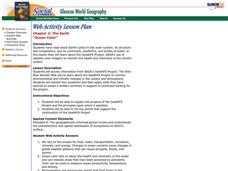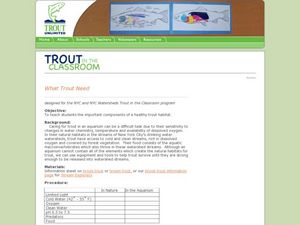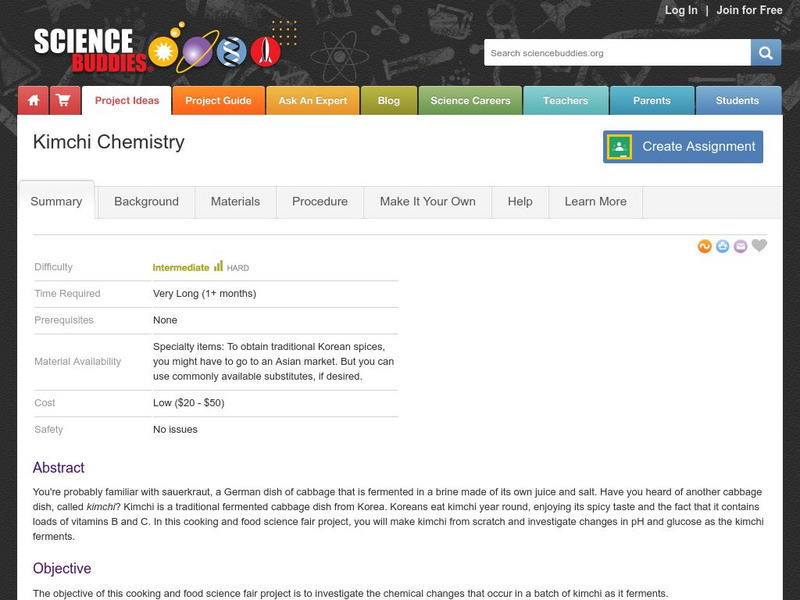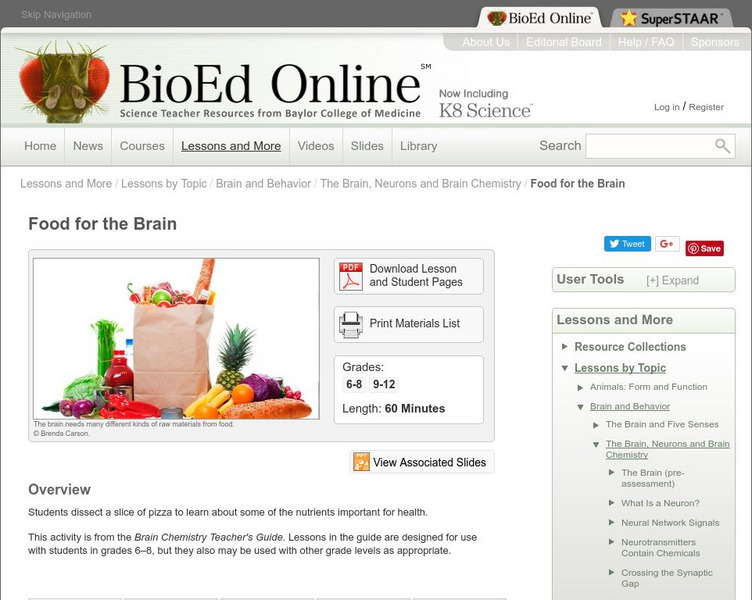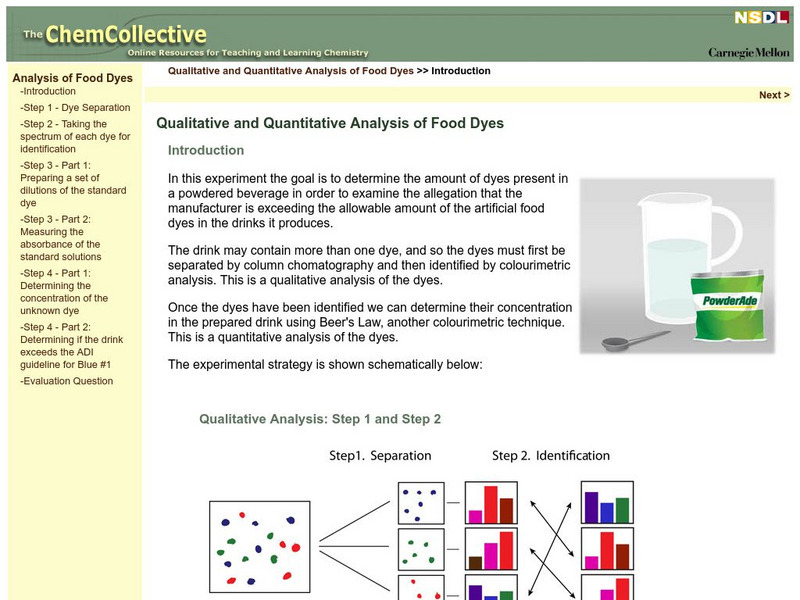Curated OER
Are Polymers Photodegradable?
Students study the term photodegradability and how it applies to the 6-pack loop ring. For this materials lesson students test photodegradability of the 6-pack plastic ring.
Curated OER
Spectrophotometry Lab
Students use a machine called a spectrophotometer to determine how much light is absorbed by certain substances. Students record the absorbance and the % of light transmitted for different color solutions, graph their results, and then...
Curated OER
Ocean Color
Students examine NASA's SeaWiFS Project Web site to explore how the SeaWiFS Project monitors environmental and climatic changes in the oceans and atmosphere. They answer questions and write a summary in support of continued funding for...
Curated OER
Mini-Volcanoes!
Students define volcanoes and why they erupt. Using baking soda, vinegar, and soap detergent, students create and observe their own volcanoes erupting. A brain-pop video can be used to follow-up the activity (found on website).
Curated OER
Is it Alive?
Students watch a demonstration using Duco glue and water and try to determine if the "monster" shown is alive. After the demonstration, they discuss what characteristics make an organism "alive". They participate in a card sorting...
Curated OER
It Looks Like Champagne
Students determine some practical implications of the discovery of liquid carbon dioxide in deep-ocean ecosystems. They interpret phase diagrams and explain the meaning of "critical point" and "triple point."
Curated OER
Pigment Plucking
Pupils examine pigments found in different fruits and vegetables and practice the processes for extracting the pigments. Pigments are used to create artwork and a class PowerPoint presentation is made on the different types of plant...
Curated OER
Frozen Water Before? I'm Sure You Have; But I Bed You've Never Frozen Salt Water! Water!!
High schoolers examine what happens to salt water when it freezes. In groups, they measure density and salt concentrations in different samples of water and record its freezing time. They discuss the relationship between water density...
Curated OER
Water
In this water learning exercise, students compare and contrast elements and compounds. Students define chemical symbols, chemical formulas, and chemical properties. This learning exercise has 19 short answer questions.
Curated OER
What Trout Need
Young scholars investigate the important components for a healthy trout habitat. In this fish habitat lesson plan, students discuss how the aquarium will simulate a trout's environment in nature. Young scholars complete a trout...
Curated OER
Photosynthesis and Respiration
Eighth graders differentiate photosynthesis and respiration. In this biology lesson, 8th graders draw a diagram explaining these two processes. They answer a quiz after the lesson.
Massachusetts Institute of Technology
Mit: Open Course Ware: Courses: Kitchen Chemistry
College-level online course focusing on kitchen chemistry. Course explores the application of chemistry in recipes and cooking. Course features include links to readings, lecture notes, and a wealth of related links.
Massachusetts Institute of Technology
Mit: Open Course Ware: Advanced Kitchen Chemistry
College-level advanced course on kitchen chemistry. Course topics highlight the scientific exploration of all types of food. Features online include downloadable assignments and readings, and a number of food chemistry-related links.
Thinkport Education
Thinkport: Designing a Healthier, Happier Meal: Stem Career: Food Chemist
Learn about chemists who specialize in food chemistry- the study of chemical processes and interactions in our foods.
Science Buddies
Science Buddies: Project Ideas: Kimchi Chemistry
In this cooking and food science fair project, the student will make a batch of kimchi, the national dish of Korea, and investigate the changes in pH and glucose concentration as it ferments. The Science Buddies project ideas are set up...
BioEd Online
Bio Ed Online: Food for the Brain
The brain needs many different kinds of raw materials from food and ecommended serving sizes are often smaller than the size actually served or the amounts people eat. In this instructional activity young scholars are introduced to this...
Vision Learning
Visionlearning: Food Chemistry: Carbohydrates
Read about carbohydrates, which make up one of the three "Major classes of macronutrients that are essential to living organisms." In addition to defining several terms, including carbohydrate, simple sugars, complex carbohydrates,...
Science Struck
Science Struck: Examples of Chemistry in Everyday Life
Gives examples of chemical interactions occurring in the human body, in the world around us, in foods, and in products we use.
Royal Society of Chemistry
Royal Society of Chemistry: Experimentation Hub: Measuring Vitamin C in Food
A chance to complete an experiment with students around the world! This experiment requires students to test how much vitamin C is in certain foods. Once students receive their results, they post their findings to the page to compare to...
US Department of Labor
Bureau of Labor Statistics: Agricultural and Food Scientists
This resource provides information about careers focusing in agriculture and food sciences.
Royal Society of Chemistry
Royal Society of Chemistry: Kitchen Chemistry
A scientific approach to kitchen skills takes a look at the chemistry involved in preparing the food we eat.
Royal Society of Chemistry
Royal Society of Chemistry: Kitchen Chemistry: Video Clips
Sixteen program clips of various kitchen chemistry topics. See chefs at work carrying out edible chemistry experiments.
Carnegie Mellon University
Chem Collective: Qualitative and Quantitative Analysis of Food Dyes
An interactive tutorial to determine the amount of dyes present in a powdered beverage in order to examine the allegation that the manufacturer is exceeding the allowable amount of the artificial food dyes in the drinks it produces.he...
Other
Black Inventors: Lloyd Hall
Lloyd Hall was a pioneer in the field of food chemistry, preservation, and sterilization.
Other popular searches
- 4th Grade Food Chemistry
- Food Chemistry Pdf
- Food Chemistry Quiz
- Food Chemistry Pancakes
- Food Chemistry Protein
- Food Chemistry Detection
- Food Chemistry Mcq
- Food Chemistry Pd
- Food Chemistry Cakes
- Food Chemistry Protien
- Food Chemistry Mc
- Food Chemistry Pancackes




